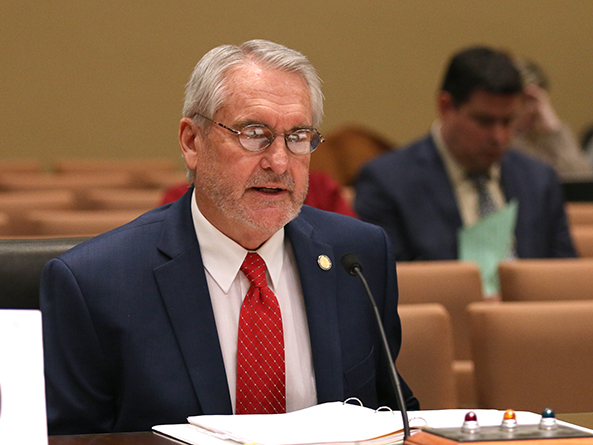Behavioral awareness training proposed for school staff
Nebraska school districts would train teachers, administrators and other staff regarding how to manage student behavior under a bill heard Jan. 27 by the Education Committee.
Under LB998, sponsored by Sen. Dave Murman of Glenvil, each district would offer behavioral awareness and intervention training to teachers, administrators, paraprofessionals, school nurses and counselors each year beginning with the 2021-22 school year.
It would require those staff members to receive the training before the end of school year 2024-25 and to receive a review at least once every three years.
Although many Nebraska schools already provide similar training, Murman said, LB998 would ensure that every school employee has at least basic training in managing student behavior.
“This bill would allow schools to train their employees to recognize what is and what is not…a reasonable response to problem behavior using mainstream, evidence-based, industry standard practices,” he said.
The required training would include six components:
- recognition of detrimental factors impacting student behavior, including trauma;
- positive behavior support and proactive teaching strategies;
- verbal intervention and de-escalation techniques;
- clear guidelines on removing students from and returning them to a class;
- behavioral interventions and supports that will happen after a student is removed from a class; and
- physical intervention for safety.
Schools also could provide the training to other employees, and LB998 would require all employees to “have a basic awareness of the goals, strategies and schoolwide plans included in such training.”
Districts would receive a base training reimbursement of $2,000 for each school building with grades above kindergarten. Schools with 80 or more full-time teachers would receive additional reimbursement.
LB920, introduced by North Platte Sen. Mike Groene, would direct state lottery dollars to a newly created fund that would be used to pay for the training. The state Department of Education estimates that the fund would receive $1.9 million annually.
LB998 also would require each district to designate at least one employee as a behavioral awareness and intervention point of contact for each school building. Districts would have to maintain or have access to an existing registry of local mental health and counseling resources, and the bill would require each point of contact to “coordinate access to support services for students whenever possible.”
Districts also would be required to submit an annual report including the district’s training plan to the state school security director. Districts would not qualify for training reimbursement if they do not file the report or if they fail to comply with the bill’s provisions.
Rita Bennett testified in support of the bill on behalf of the Lincoln Education Association and the Nebraska State Education Association. Bennett, a teacher for nearly 30 years, recalled one student’s angry outburst and said she could have managed it more confidently and effectively with proper training in de-escalation techniques.
“I felt helpless and ill-prepared for that situation,” Bennett said, “and I know I did a disservice to that student and to others around him simply because I lacked the knowledge and training that I needed.”
Kyle McGowan also testified in support on behalf of the Nebraska Council of School Administrators and the Nebraska Association of School Boards. He said the bill would benefit all Nebraska schools by incorporating practices used at Boys Town to manage some of the most difficult student behaviors.
“We also appreciate the effort to provide some funding, [although] it probably is not going to be enough,” McGowan said.
John Skretta, administrator of ESU 6, also testified in support. He said the proposed training is essential to give teachers, administrators and paraprofessionals the skills they need to work with the increasing number of Nebraska students who have behavioral and mental health problems.
Skretta said the state’s educational service units have personnel who are trained in crisis prevention and de-escalation techniques and are prepared to help school districts meet the bill’s requirements.
Spike Eickholt provided neutral testimony on behalf of ACLU of Nebraska. He said the ACLU supports most of the bill’s provisions but is concerned about the implications of one section that appears to be linked to LB147, a related bill introduced by Groene last year and currently on general file.
That bill would give teachers and administrators legal protection for defending themselves and others against violent students as long as they acted reasonably.
Eickholt said the section in question seems to undermine the purpose of LB998 by stating that the proposed protections and defenses in LB147 are not contingent on whether those employees have received the training required by LB998.
No one testified in opposition to the bill, and the committee took no immediate action on it.


